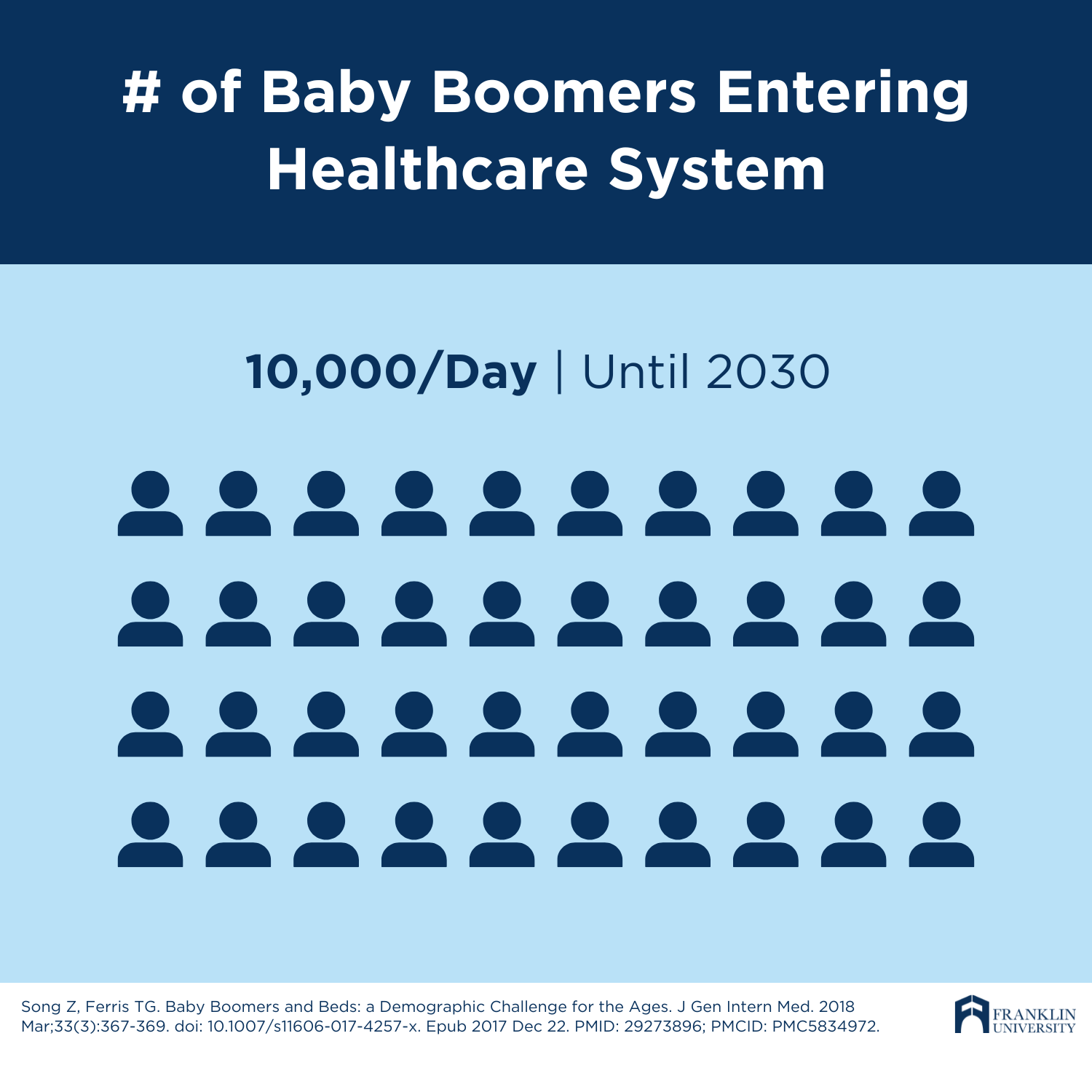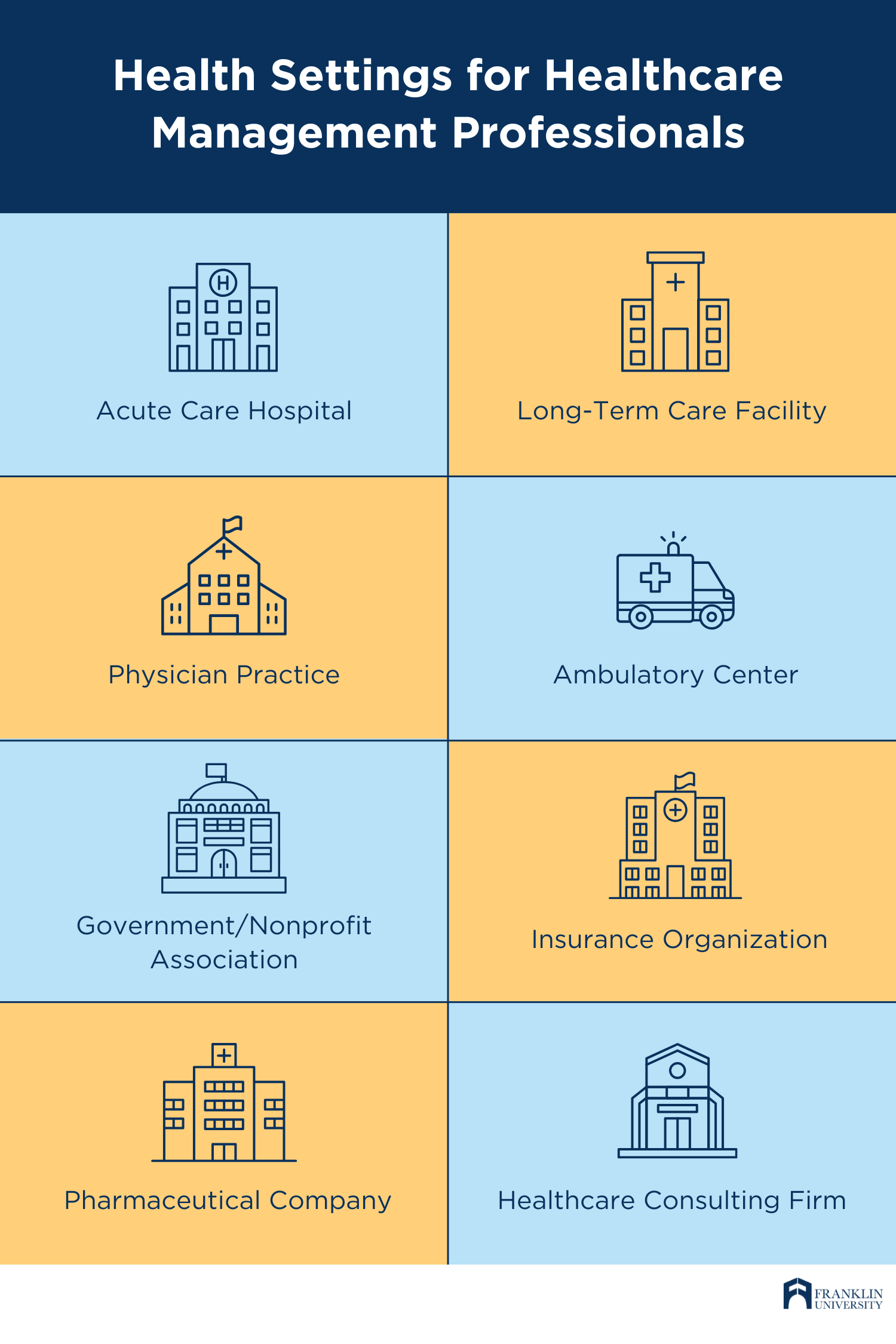Request Information
We're Sorry
There was an unexpected error with the form (your web browser was unable to retrieve some required data from our servers). This kind of error may occur if you have temporarily lost your internet connection. If you're able to verify that your internet connection is stable and the error persists, the Franklin University Help Desk is available to assist you at helpdesk@franklin.edu, 614.947.6682 (local), or 1.866.435.7006 (toll free).
Just a moment while we process your submission.

Is a Healthcare Management Degree Right For Me?
“I’m thinking about going back to school and getting a degree in healthcare management but I’m not sure if it’s right for me. What do I need to know about healthcare management degrees to help me decide?”
Ever thought about working in healthcare but wondered what else you could do instead of becoming a provider? Or, if you’re already in healthcare, are you curious about what you could do to give yourself a career edge? You’re not alone. A healthcare management degree appeals to a lot of people because of the opportunities it can open up, not to mention the earnings potential in what is definitely a booming industry.
If this sounds like you, keep reading for some guidance on what to consider if you want to move into (or go higher with) a healthcare management career.
Healthcare Management: Visionaries Needed
“Expert.” It’s a word that means having some special knowledge about something. These days, anyone can claim to be an expert; which means that it has lost much of its meaning and impact–except in the world of health information and health services.
Because the American healthcare system has been in flux for years now with providers, insurers and lawmakers all trying to figure out what to do, healthcare needs experts who can help solve these and other issues:
- Health services disparities and access
- Cost of care and insurance
- Ethical considerations
- The growth of an aging population
- Labor shortages
If there’s ever been a real need for real experts in healthcare, it’s right now, says Franklin University’s Leslie Mathew, MD, MS, EMBA, FACHE, chair of the Master of Healthcare Administration and Healthcare MBA programs.
Advance your career in Healthcare Administration while you advance patient care. Download your free career guide.
“Hospitals, extended care facilities and primary care practices all need expert managers. The trend of nearly 10,000 Baby Boomers becoming Medicare eligible every day will continue until 2030, at least,” Dr. Mathew says. “Which means there are literally millions and millions of people needing healthcare. The American healthcare system is desperate for people who can align quality patient care with the goals, reporting and planning of the institution. Bottom line? We need visionaries in healthcare administration and management.”

As a physician who spent 35 years in medicine before moving into management 20 years ago, Dr. Mathew strongly believes that well-prepared experts are crucial to improved patient care and operational efficiency. Those experts, he says, will be qualified healthcare management professionals responsible for running the business behind medical care, without compromising delivery or quality of care.
What Can a Healthcare Management Degree Do for Me?
So where does a visionary healthcare expert get a job if they’re not in the so-called blood-and-guts world of patient care?
Anywhere patient care is delivered---and not just in a hospital.
“Most of my students ask, ‘How do I get a job in a hospital?’” says Dr. Mathew. “I tell them that the hospital is the end point, the largest institution. But the continuum of care is changing. Don’t just look at hospitals because the job market for healthcare management is literally unlimited.”

A healthcare management degree can equip you for a variety of management roles within a wide range of healthcare settings, including acute care hospitals, long-term care facilities, physician practices, ambulatory centers, government and nonprofit healthcare associations, insurance organizations, pharmaceutical companies and healthcare consulting firms.
A healthcare management degree can prove invaluable for anyone looking to have an impact on the system. As Dr. Mathew explains, “Healthcare is a people-caring-for-people business enterprise that requires delivering excellence not just medically but also operationally. Never has there been a greater need than now for dynamic leaders who are experts at solving problems.”
Is a Healthcare Management Degree Right for Me? 3 Things to Think About.
1. Find your passion and follow it.
“Asking yourself what you really want to do, what’s your passion, is really important,” says Dr. Mathew, “If the answer is ‘I love people,’ I’d take that as a very good sign.” That’s why Dr. Mathew says that when he counsels potential undergraduate students on whether a healthcare management degree is right for them, the first and biggest question he asks is, “What makes you come alive?”
2. Consider the career possibilities.
Going back to college is no small thing so you want to be sure there’s a return on your investment. Fortunately for healthcare management, the employment outlook is extremely bright. The U.S. Bureau of Labor Statistics predicts a growth rate of 28% to 2031, which is considerably faster than the 3% average for all occupations combined. The BLS also reports that projected employment, 2031 for medical and health services managers is well over a half-million, 616,900 to be exact.
3. Check yourself.
“We have one of the least effective healthcare systems in the world when it comes to cost-per-patient and patient outcomes,” says Dr. Mathew. “We’re not missing technology, education or elaborate systems. We're missing people who can lead the way to serve the betterment of our communities.” If that sounds like you, then an online healthcare management degree might be right for you.
Here a checklist of other things that could indicate you’re headed in the right direction:
- You enjoy keeping up with healthcare trends.
- You’re willing to acquire new skills.
- You like to have a 360-degree view of things.
- You view healthcare management as a way to bring patient care, quality and safety together.
- You’re ready to make yourself more hireable and in demand.
- You’re a people person who wants to serve others.
- You’re looking to make an impact on a scale that goes beyond one-on-one patient care.
- You have a desire for a personally and professionally rewarding career.
What Jobs Can I Get with a Healthcare Management Degree?
People who want non-patient-facing careers have plenty of opportunities in healthcare if they have a bachelor’s degree in healthcare management, says Dr. Mathew. Opportunities range from healthcare leadership to quality management to healthcare informatics to public and community health.
Here’s a look at a few of the specific job titles, salaries and responsibilities that someone with a bachelor’s in healthcare management can expect:
Administrative Services Manager | $99,290
- Ensure organizational efficiency
- Plan and manage operational activities and recommend improvements
Health Information Technologists and Medical Registrars | $55,560
- Analyze and synthesize data
- Track patient outcomes and validate patient data
Medical and Health Services Manager | $101,340
- Oversee and direct medical and health services
- Develop and implement policies and procedures to ensure compliance
Social and Community Service Managers | $74,000
- Develop and implement programs and services
- Manage administrative aspects of activities and programs
So, is a healthcare management degree right for you?
Only you can decide. But the right undergraduate program or online degree program can help you prepare for a fulfilling career in a fast-growing industry.
Ready to move from where you are to where you want to be? Take the first step toward your bachelor's degree in healthcare management.





